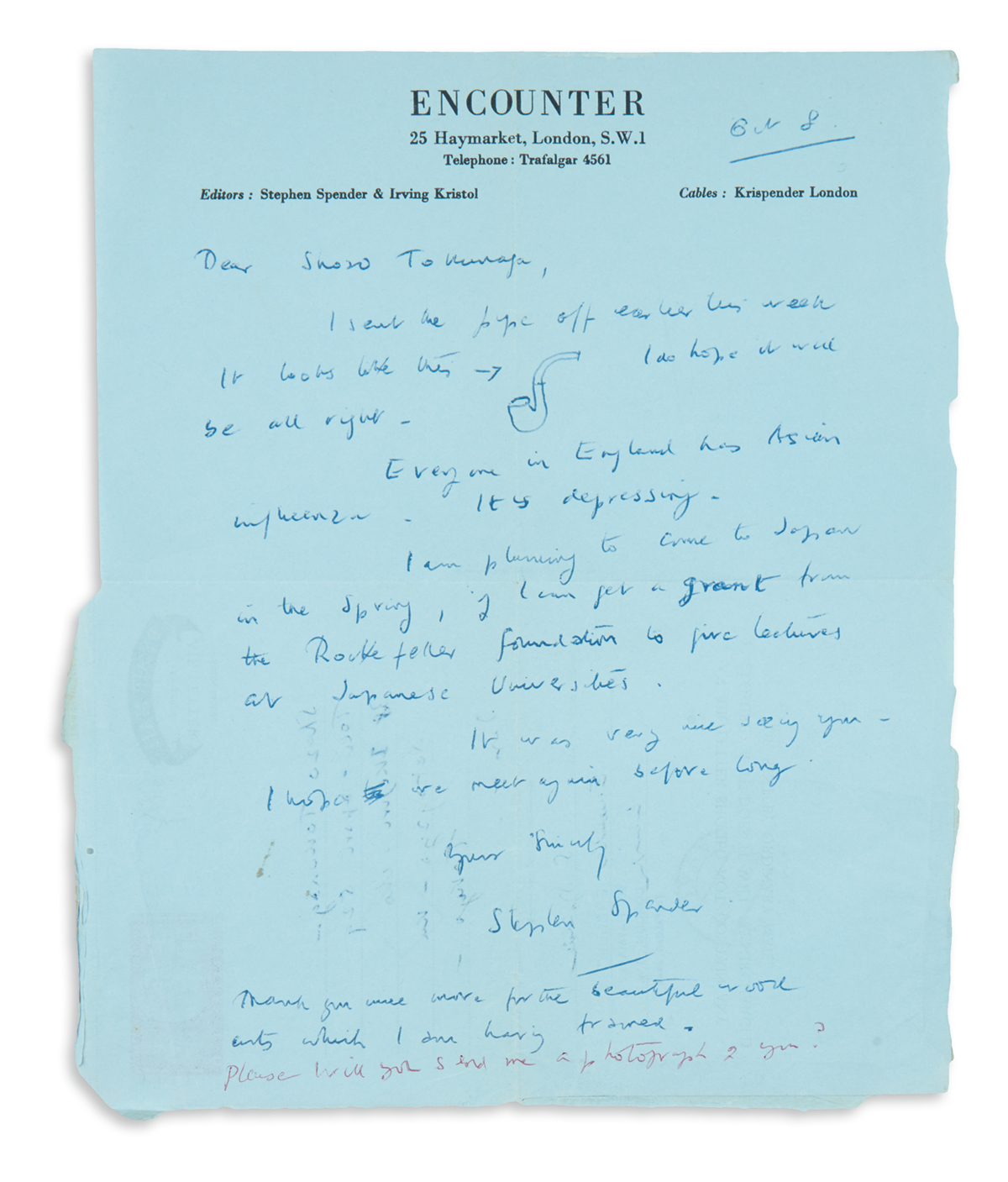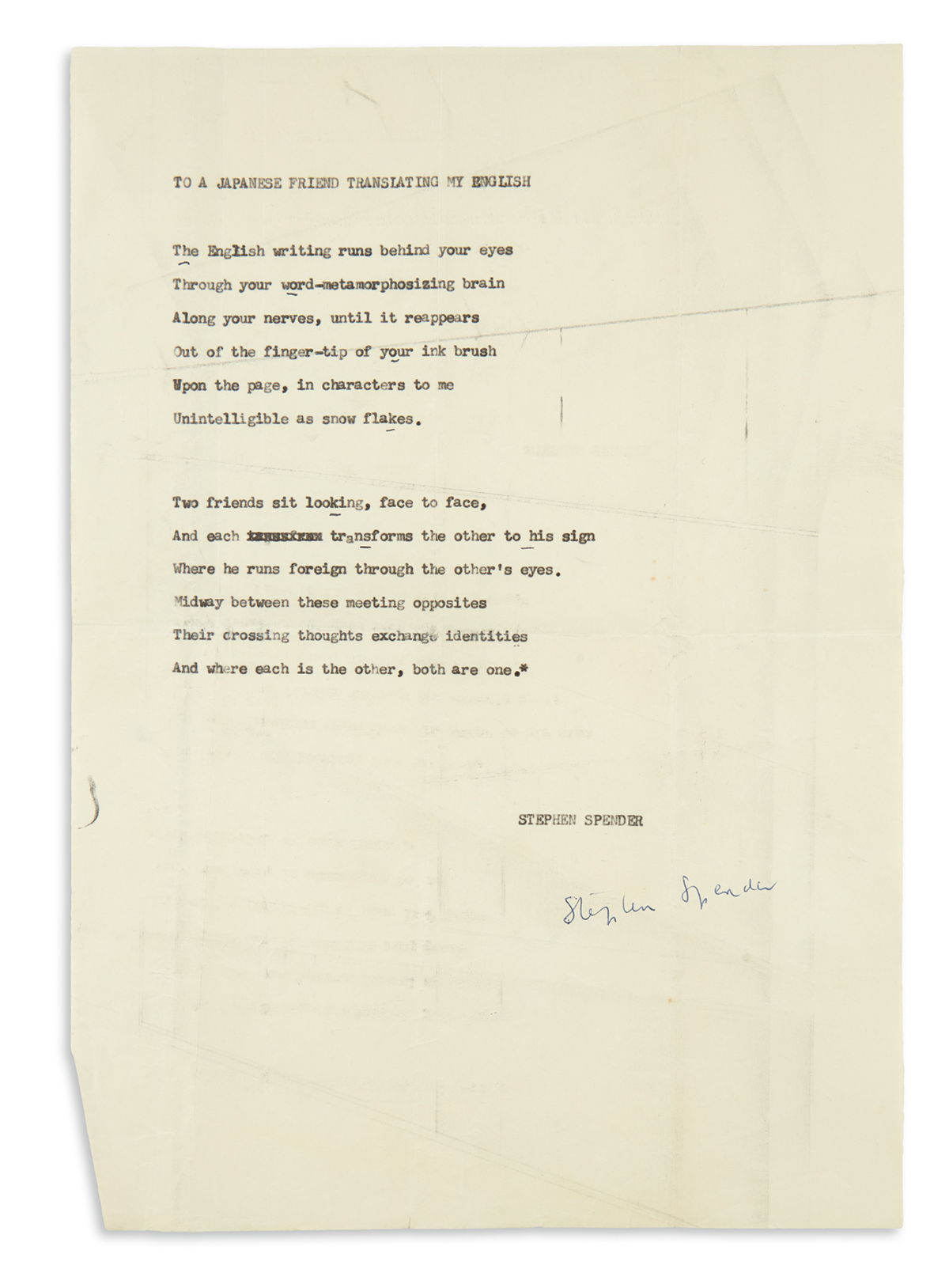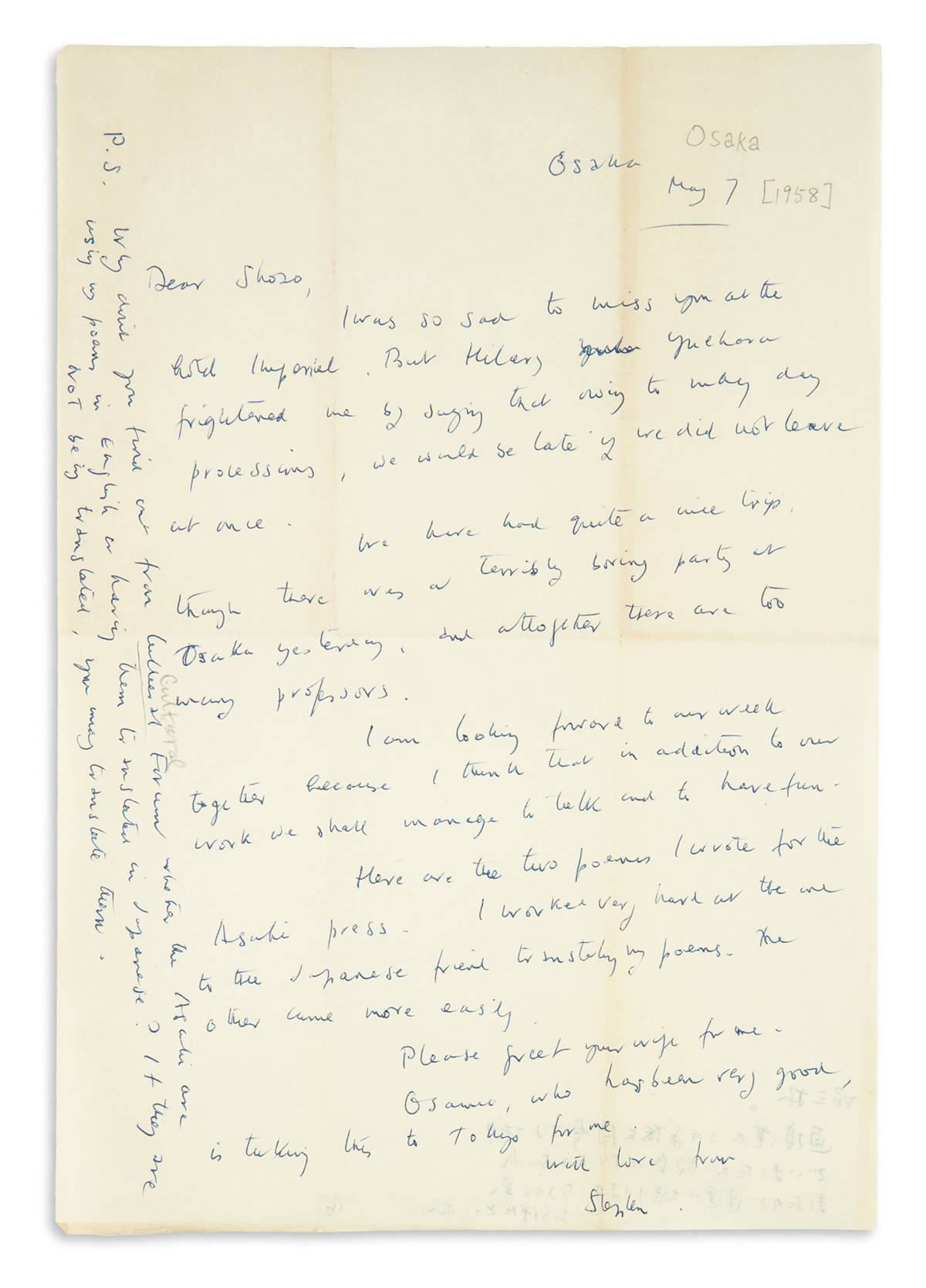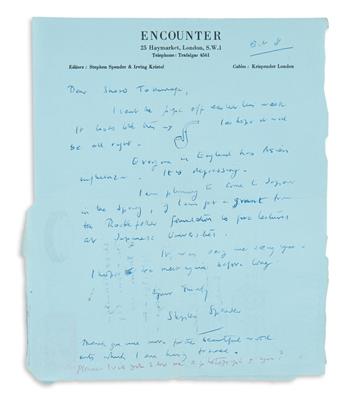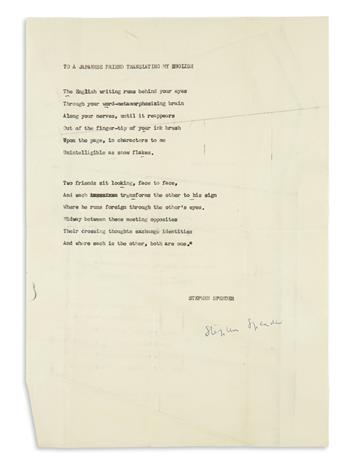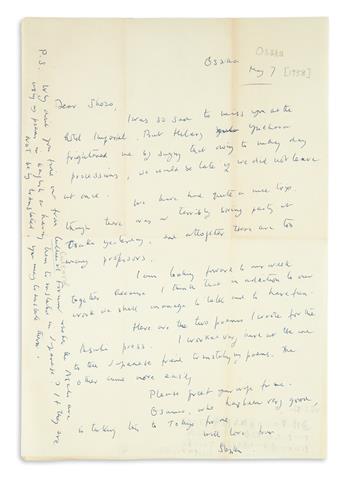Sale 2530 - Lot 152
Price Realized: $ 2,600
Price Realized: $ 3,250
?Final Price Realized includes Buyer’s Premium added to Hammer Price
Estimate: $ 800 - $ 1,200
SPENDER, STEPHEN. Archive of 68 items sent to translator Shozo Tokunaga: 65 letters Signed, "Stephen" or in full * 3 typescripts, Signed or with holograph emendations. The letters, including 56 Autograph Letters, and 9 Typed Letters, mostly on personal subjects but many with literary content, a few illustrated with sketches. Together 102 pages, 4to or 8vo, many on aerogram paper or Encounter stationery; generally good condition. Each with the original envelope or address panel. The typescripts, including a two-stanza poem Signed entitled "To a Japanese Friend Translating My English," a 3-page untitled interview concerning his views on English literature and theater, and an 8-page essay entitled "The English Poet in the Modern World." Together 12 pages, folio or 4to, written on rectos only; the essay with moderate scattered staining and chipped edges. Vp, 1957-94
Additional Details
8 October [1957]: ". . . I am planning to come to Japan in the spring, if I can get a grant from the Rockefeller Foundation to give lectures at Japanese universities. . . .
22 October [1957]: ". . . I work all the morning at the magazine; and at home most evenings I do my own work. But I am not satisfied with my life, because I seem to waste too much time--which I do because I am not satisfied. Probably people in Japan get into this kind of tangle also. One reason why I want to spend several weeks in Japan and Asia is because I want to create a kind of distance between myself and my present life. . . ."
10 September 1958: ". . . I have been entirely taken up with Mary Stuart--the Schiller play which I translated and which is now running at the Edinburgh Festival. Fortunately it has gone very well.
"I am very glad that your translations of my poems have been praised.
"I like also your translation of Shinzue Ueda's poem The Sea. The more I think about you, dearest Shozo, the more I see that you really are a poet in all your feelings, and your sensibility. . . .
". . . My stupid remarks about Wordsworth: What I meant was to draw a contrast between the Japanese attitude toward poetry, which I take to be that poetry is a matter of the poetic form and language coinciding with the poetic moment in experience--and on no account going outside this--and the English attitude, that poetry can essentially be about the whole of life, and that a poem which covers a lot of ideas or experiences, does not have to be good poetry all the time, in fact it rises to poetry. So what I really meant in saying that Wordsworth sometimes writes poetry that is not poetry at all, is that sometimes he simply writes a kind of chopped up rambling prose--although he also rises to occasions when he writes some of the greatest poetry in the English language. . . .
". . . My stupid remarks about Ezra Pound and the imagists: The imagists--who were influenced by their ideas about Japanese Haiku--thought that poetry should consist of nothing except images. Form and music left them indifferent . . . . What I care for in poetry is that it should become part of my central experience of living: and delight in imagery seems to me rather peripheral. . . ."
27 March 1959: ". . . I am doing a series of lectures here on the theme of the Obsession of Modern Writers with the Modern World.. They have been quite successful. They will be rewritten before they are published and then I shall send you a copy in case you care to translate it. . . ."
8 May 1961: ". . . I am writing about thirty or forty or fifty poems all at once. When I am away, abroad, I manage to do a lot, however much I have to bore audiences with my lectures . . . . But when I am in London and go to the office every day, and have to see so many people, and worry about all the bills that come in, and write articles, it is more difficult. In fact I haven't written any poetry for about two weeks, which is the first gap this year. . . . I am writing a long essay on Shakespeare's sonnets . . . ."
5 October 1965: ". . . Washington quite depresses me. It is gloomy and oppressive and I never see anyone except on official engagements. The library is of course wonderful, and I have a very nice work room where I study and write almost without interruption. But the corridors are thick with bureaucrats wearing steel rimmed spectacles and policemen wearing badges the shape of iron hearts. . . .
". . . I shook hands with President Johnson . . . . It was like shaking hands with a model of a sheriff in a cowboy western, made out of leather. His face usually only has two expressions--frowning or smiling--but for me it had NONE. Lady Bird did wink a bit when I shook her hand, but not with pleasure. . . ."
7 February 1968: ". . . I am overwhelmed by having to write the Mellon lectures, which I give in Washington next month. I have to give six lectures on imagination in poetry and painting. I think they will be the best criticism I have written, as the subject is so interesting. . . ."
2 June 1970: ". . . One of the worst things (in a public way) that ever happened to me was to discover that Encounter was paid for by the CIA. So I don't ever want to accept anything for which the money may come from the same source--indirectly even. . . ."
20 June 1982: ". . . A year ago, David Hockney and I went to China and we did a book called Chinese Journal about it. 60,000 words by me and about 100 photographs and drawings. . . ."
22 October [1957]: ". . . I work all the morning at the magazine; and at home most evenings I do my own work. But I am not satisfied with my life, because I seem to waste too much time--which I do because I am not satisfied. Probably people in Japan get into this kind of tangle also. One reason why I want to spend several weeks in Japan and Asia is because I want to create a kind of distance between myself and my present life. . . ."
10 September 1958: ". . . I have been entirely taken up with Mary Stuart--the Schiller play which I translated and which is now running at the Edinburgh Festival. Fortunately it has gone very well.
"I am very glad that your translations of my poems have been praised.
"I like also your translation of Shinzue Ueda's poem The Sea. The more I think about you, dearest Shozo, the more I see that you really are a poet in all your feelings, and your sensibility. . . .
". . . My stupid remarks about Wordsworth: What I meant was to draw a contrast between the Japanese attitude toward poetry, which I take to be that poetry is a matter of the poetic form and language coinciding with the poetic moment in experience--and on no account going outside this--and the English attitude, that poetry can essentially be about the whole of life, and that a poem which covers a lot of ideas or experiences, does not have to be good poetry all the time, in fact it rises to poetry. So what I really meant in saying that Wordsworth sometimes writes poetry that is not poetry at all, is that sometimes he simply writes a kind of chopped up rambling prose--although he also rises to occasions when he writes some of the greatest poetry in the English language. . . .
". . . My stupid remarks about Ezra Pound and the imagists: The imagists--who were influenced by their ideas about Japanese Haiku--thought that poetry should consist of nothing except images. Form and music left them indifferent . . . . What I care for in poetry is that it should become part of my central experience of living: and delight in imagery seems to me rather peripheral. . . ."
27 March 1959: ". . . I am doing a series of lectures here on the theme of the Obsession of Modern Writers with the Modern World.. They have been quite successful. They will be rewritten before they are published and then I shall send you a copy in case you care to translate it. . . ."
8 May 1961: ". . . I am writing about thirty or forty or fifty poems all at once. When I am away, abroad, I manage to do a lot, however much I have to bore audiences with my lectures . . . . But when I am in London and go to the office every day, and have to see so many people, and worry about all the bills that come in, and write articles, it is more difficult. In fact I haven't written any poetry for about two weeks, which is the first gap this year. . . . I am writing a long essay on Shakespeare's sonnets . . . ."
5 October 1965: ". . . Washington quite depresses me. It is gloomy and oppressive and I never see anyone except on official engagements. The library is of course wonderful, and I have a very nice work room where I study and write almost without interruption. But the corridors are thick with bureaucrats wearing steel rimmed spectacles and policemen wearing badges the shape of iron hearts. . . .
". . . I shook hands with President Johnson . . . . It was like shaking hands with a model of a sheriff in a cowboy western, made out of leather. His face usually only has two expressions--frowning or smiling--but for me it had NONE. Lady Bird did wink a bit when I shook her hand, but not with pleasure. . . ."
7 February 1968: ". . . I am overwhelmed by having to write the Mellon lectures, which I give in Washington next month. I have to give six lectures on imagination in poetry and painting. I think they will be the best criticism I have written, as the subject is so interesting. . . ."
2 June 1970: ". . . One of the worst things (in a public way) that ever happened to me was to discover that Encounter was paid for by the CIA. So I don't ever want to accept anything for which the money may come from the same source--indirectly even. . . ."
20 June 1982: ". . . A year ago, David Hockney and I went to China and we did a book called Chinese Journal about it. 60,000 words by me and about 100 photographs and drawings. . . ."
Exhibition Hours
Exhibition Hours
Aliquam vulputate ornare congue. Vestibulum maximus, libero in placerat faucibus, risus nisl molestie massa, ut maximus metus lectus vel lorem.



